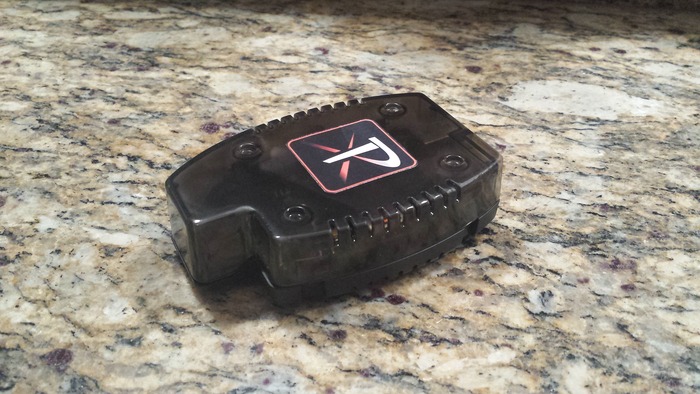
Meet Pixeom, a prototype device being Kickstarted by brother and sister duo Karishma and Sam Nagar, with the aim of offering alternative cloud services that don’t require you to hand over the keys to your private data in exchange for a convenient digital service.
Prior to Edward Snowden’s revelations about the NSA‘s (and other governments’ security agencies‘) dragnet surveillance of everyone’s online lives, Pixeom would probably have sunk without a trace. Or not even been conceived of as a mainstream project at all.
But, post-Snowden, there’s a perfect storm of cloud-computing concerns amassing to undermine the convenience of mainstream online services. And, after a month seeking crowdfunding on Kickstarter, Pixeom has passed its funding target of $50,000 — with close to 400 backers, and still has 15 days left to run on its campaign.
In addition to the funds it’s currently raising on Kickstarter, Pixeom has also secured more than $500,000 in private funding to get this personal cloud device to market.
It’s clear that Snowden has shone a light on something very rotten lurking at the core of mainstream cloud services. Sure, web mail clients are handy — and you get a chunk of free storage — but you’re also effectively handing the keys to your inbox over to the NSA (et al) should they happen to feel like dipping into your personal correspondence one lunchtime or other.
And of course it’s a given that your personal data will be mined by the service provider; it’s a free service, so your privacy is the product. This general snooping on/data-mining of users is a routine business model for the majority of free cloud-based services and apps.
Multiple big name tech giants have built hugely lucrative businesses off of selling your likes and dislikes to advertisers in exchange for furnishing you with a platform where you can share that data in the first place. Or store the personal stuff they need to peek at to gather sellable intel on you.
Plus there’s also the sloppy security of (certain) startups that leak your personal info all over the Internets just because they’re more interested in expanding their user-base than expending effort on adequate security measures.
So it goes.
Or so it has, but — whipped up by the storm of snooping revelations — some counter-currents are (finally) emerging to challenge the accepted wisdom that accessing the convenience of cloud services necessitates giving up your personal data and abandoning any shred of privacy in the process.
Projects like Blackphone or the Dark Mail Alliance. And now Pixeom. Pixeom’s makers say they want to facilitate a new type of data exchange for Internet users which is hosted on an anti-corporate cloud that sits in your own home — i.e. not somewhere in a vast datacenter in California where giant branded spiders can crawl all over it.
One half of the Pixeom founder team, Sam Nagar, who previously worked as a software engineer at Microsoft in Mountain View, describes the device as follows:
In a nutshell:
1. All of your cloud services in a box for a small one-time cost, we are a combination of Dropbox/Box/Facebook/Shopify with a focus on privacy.
2. Scalable device that continues to grow as one large storage pool instead of multiple “islands” of user data.
3. An optional exchange network that anyone can browse full of public content from people’s devices that can one day rival the large datacenter based public networks.
What exactly is Pixeom? It’s a personal, encrypted cloud device that plugs into your home Internet via Ethernet and provides cloud storage for your digital content without having to go through any third party intermediaries, and with support for unlimited expansion of said storage — either by chaining together multiple Pixeoms, or by plugging in additional USB hard drives.
The device is not just focused on storage though. The Pixeom platform also offers alternative cloud apps to replace online services — name-checking the likes of Dropbox, Box, Google Drive, Microsoft Sharepoint, Facebook and Amazon as services it wants to offer an alternative to — in a simpler (and potentially cheaper) way than by having to set up a NAS box or host your own server.
The three apps that will be included with Pixeom at launch are called File Exchange; Club Exchange; and Market Exchange — and they support, respectively, file-sharing & document back-up, collaboration & syncing across multiple devices; discussion boards for secure communication and digital socialising; and an interactive storefront for buying and selling, with Dwolla payment processing built-in.
Or, in other words, alternatives to stuff like Google Docs, Dropbox, Facebook, and Amazon Marketplace.

There are also no subscription fees for using Pixeom or its apps. The business model relies solely on selling the hardware itself.
The device is powered by a Raspberry Pi microcomputer — making it low power and helping to keep the cost down (early bird Kickstarter pledges for a $100 Pixeom are all gone but you can bag the device for $125). Each Pixeom has 16GB of internal storage, expandable via two USB ports to plug in your own hard drives.
Pixeom users can also choose for their device to stay private or invite trusted friends to collaborate within the secure network. There’s also an option to join a global network of Pixeom devices so that public content can be shared/advertised within that wider network.
If all goes to plan Pixeom’s founders are aiming to ship to backers in May. You can see the pair’s full Kickstarter pitch in the below video.




